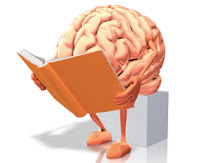The reason this happens is because people no longer want to make a distinction between the psychological and the biological. It is said to be a false separation (see eg. another previous post). The fear is that the mind/body split of Cartesianism is being perpetuated by seeing mental disorder as psychological, said to be implying it is not biological (see eg. yet another previous post). Better to do away with any distinction at all, is the thought.
As I've said before (see eg. previous post), René Descartes (1596–1650) was the first to apply a natural-scientific mechanistic approach to life Animate and inanimate matter were understood by the same mechanistic principles. Animals were, therefore, regarded as machines; and human physiology was also seen as mechanistic. Descartes stopped short, though, of including the human mind in this mechanistic framework. The soul was denied any influence in physiology. Descartes thereby avoided the materialistic implication that man himself is a machine. The split he created between mind and brain is what is referred to as Cartesianism.
One of the first to challenge this perspective was Georg Ernst Stahl (1660–1734). He claimed that living things possess an immaterial soul, although he did not necessarily mean a transcendent soul, that provided the key element of movement to matter within the living body. His ‘dualistic’ notion was different from that of Descartes, in that he differentiated organic life from the inorganic, not the soul from the body. Unlike Descartes, he proposed that the soul and body are not separate but integrated in the organism. Despite his vitalism, Stahl originated a holistic perspective in the life and human sciences. This perspective formed the basis for his emphasis on psychosomatic medicine, and a focus on clinical medicine rather than the physical sciences. But his vitalism is as much derided, now, as Cartesianism. Although it makes sense to distinguish life from inanimate matter, a more modern way of expressing this is through enactivism, rather than vitalism (see eg. previous post).
The mereological fallacy helpfully highlights that even though mental disorder is mediated by the brain, this does not imply that it is necessarily represented in the brain. Of course, cerebral disease or abnormality can cause mental disorder. But the vast majority of mental disorder is functional, not structural. It is not represented in the brain as such. It doesn’t make sense to see it as being in the brain. Even delirium and dementia caused by cerebral disease should not be seen as being in the brain as such. It’s people that become delirious or demented, not their brains. But the cause of organic mental disorder, such as delirium and dementia, is abnormality in the brain, whereas for functional disorder, it is not. It is more to do with the whole person, not just the brain, and cannot be understood mechanically. The mental is as much biological as the physical. Because the assumption is that mediation by the brain means that all mental disorders must be in the brain, people fail to recognise that mental disorders are not always in the brain. Being more careful and avoiding language to say that the brain is the person would be a start towards that realisation.


1 comment:
Rejecting Cartesian dualism isn’t the same as saying everything is the brain (or body), though. One can take have a materialist understanding of Self that encompasses brain and mind as indivisible one.
Post a Comment